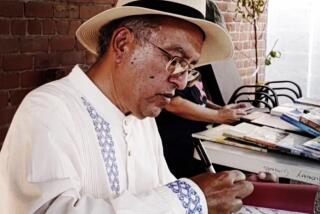Igor Cassini, 86; Wrote N.Y. Society Column
- Share via
When he wrote his first society column in the nation’s capital, a few irate scions of tony Virginia hunt society kidnapped him from a country club dance, beat him up and tarred and feathered him.
That was 1939, and he was definitely on his way to bigger things.
Igor Cassini, who later wrote Hearst Corp.’s syndicated Cholly Knickerbocker column from New York for 19 years until he was toppled by an even stronger Washington censor in the form of the U.S. Justice Department, has died. He was 86.
Cassini, the brother of fashion designer Oleg Cassini, died Saturday of natural causes in New York City.
Charming and gregarious, “Ghighi,” as his friends called him, coined the term “jet set” and became a part of it. He took credit for launching discotheques and promoting the 1960s dance craze the twist.
His chatty writing style made his column bubble with gossip, sometimes a bit barbed. And he appointed himself official arbiter of what constituted ever-changing society.
Cassini did not originate the Cholly Knickerbocker column, which during his tenure was carried by more than 100 newspapers nationwide.
The name was coined from an early nickname for New Yorkers alluding to the city’s Dutch settlers. The name belonged to Hearst, and the column was originally written by Maury Paul for Hearst’s now-defunct New York Herald-American.
But Cassini’s columns for the Washington Times-Herald-including the one that got him tarred and feathered-did not escape notice in New York. So when Paul died in 1942, Cassini was invited to replace him.
Uncle Sam had other ideas. Cassini was drafted and served in Army intelligence in Europe from 1943 to 1945, also writing for Stars & Stripes.
His first Cholly Knickerbocker column appeared Sept. 4, 1945, less than a week after his discharge. Cassini immediately signaled a sea change.
Paul had written about what he called “cafe society” and strictly adhered to the official “Four Hundred,” or those listed in the Social Register.
“I declared in my first column that times had changed, the world had changed,” Cassini once said in an interview. “The ‘Four Hundred’ had been replaced by the ‘Forty Thousand,’ and their sacred bible-the Social Register-had no meaning in a country where only a meritocracy, a society of achievement, could exist.’
Society may have been shocked, but readers generally loved the change, and the column helped boost circulation for the Journal-American and gained wider syndication. Cassini promoted himself into a television series, the “Igor Cassini Show,” for NBC and later the Dumont network from 1951 to 1956.
The columnist survived the tar-and-feather treatment-although it took doctors three hours to remove the goo, allegedly applied because he wrote about one assailant’s sister getting engaged before she did and said another one’s father had been snubbed for a royal party.
But his next debacle more than two decades later was more difficult.
Cassini, who moved easily through the salons of power, had become close to the Kennedy family. He attended the wedding of future President John F. Kennedy and Jacqueline Bouvier. His brother designed many of the fashionable first lady’s clothes, and his father-in-law lived next door to the Palm Beach estate of first father Joseph Kennedy.
As a sideline-which earned Cassini nearly $1 million a year in the early 1960s-he operated a public relations business in Manhattan.
In 1961, Cassini told the president’s father that there was a left-wing revolution brewing in the Dominican Republic. Word was passed to the president, and former Undersecretary of State Robert D. Murphy was dispatched to talk with dictator Rafael Trujillo in the troubled country. Six weeks later, Trujillo was assassinated in a coup.
The problem was that Cassini and his public relations firm were accepting fees to represent Trujillo’s government but had not registered as an agent of a foreign country, a requirement of the Foreign Agents Registration Act.
Cassini was indicted for violating the act, fined $10,000 and placed on six months probation.
He lost the Knickerbocker column, and his public relations company failed.
His wife committed suicide. As one political columnist summarized years later, “Igor Cassini was ruined.’
Well, sort of.
Cassini, the grandson of a former Russian ambassador to the United States, was born in Sebastopol, Russia, spoke five languages and studied at the Universities of Florence, Perugia (Italy) and Georgia. He never counted himself out.
He immediately founded a new magazine from which to dispense his social wisdom and modestly called it Status.
“The world is full of people who love to be told what to do,” he said at the time. He planned to decree what was “in” and what was “out.’
Debutantes, he offered as an example, were definitely out. “It’s a mass, public display of girls, like cattle, on the marriage market.’
When the magazine failed, Cassini moved to Europe, living in Italy and Spain and writing for Italian editions of Esquire and Harper’s Bazaar.
He also wrote his autobiography, “I’d Do It All Over Again,” published in 1977, and a novel, “Pay the Price,” in 1983.
Asked at a 1983 book party in New York if the indictment that cost him his column embittered him, Cassini said : “I was making a lot of money. I had a lot of power. I was on the crest of a wave, and I slipped.’
Married multiple times, Cassini is survived by his four children, Marina, Alexander, Nicholas and Dimitri; his brother, Oleg; and several grandchildren.
More to Read
Sign up for Essential California
The most important California stories and recommendations in your inbox every morning.
You may occasionally receive promotional content from the Los Angeles Times.













